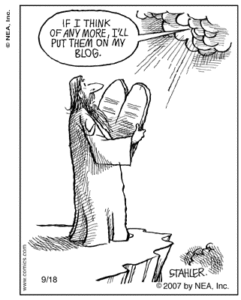The 11th Commandment
{4 minutes to read} I have written and spoken in the past about automatic court-annexed mediation programs, but maybe you haven’t heard me discuss it or read about it before. So just in case:

Certain courts force parties to go to mediation before they can continue litigating their cases through the “normal” court process. But parties shouldn’t be forced to mediate, should they? Isn’t that a decision the parties should both agree on? Isn’t a basic, guiding principle of mediation self-determination, including the decision whether or not to mediate?
Well, it turns out there are many things that courts force parties to do if they want to use the court system to resolve a dispute:
- Want to sue someone? Gotta file a complaint.
- Want to defend yourself against a lawsuit? Gotta file an answer to the complaint.
- Discovery? Oh, it takes so much time and is so expensive. Sorry, gotta do it. No choice.
- Pay your lawyer to go to a court conference to tell the judge what’s going on? Your lawyer’s gotta do it, and you gotta pay him/her to go.
It turns out the litigation process is filled with all sorts of “gottas.”
Increasingly, courts are making mediation a mandatory part of the litigation process. Don’t pass Go until you mediate. Isn’t that just another unnecessary burden placed on the parties, that will lead to more delay? And then they have to pay for the mediation? Goodness.
So here’s the good news: the data shows that in general, if you force people to mediate, you can expect about 50% of those cases to settle as a result of the mediation. That’s right – force people into a room, close the door, and voilà, whether they wanted to mediate or not, 50% will end up getting resolved. It’s much faster and much cheaper than if those cases were meandering through the court system for several years.
But wait, there’s more: The data also shows that about 10% of the cases that go to mediation but don’t settle during mediation will settle within 90-120 days after the last mediation session. Based on my experience, I’m pretty sure the reason is because mediation not only gets the parties talking, it narrows discovery. So even if a case doesn’t settle at the mediation, the parties are much further along in the litigation process than they otherwise would have been.
What, still more? Yes. Once parties and lawyers begin to learn they’ve gotta mediate a dispute before going through the expensive and time-consuming process of litigation (or even arbitration, which has increasingly become like litigation), they’re going to start mediating disputes before starting lawsuits. Indeed, some lawyers are starting to put mandatory mediation clauses into contracts, to make sure that happens.
The trend toward automatic/mandatory mediation as part of the standard court process is taking off. New York State, a bit of a laggard in that area, has recently taken the bull by the horns and will be implementing new mediation programs in the near future. More on that later.
Few of us like to be forced to do something. We much prefer free will. Especially for ourselves. Less so, perhaps, for others, who really need to fulfill their obligations.
Gary Shaffer
Shaffer Mediation
Gary@ShafferMediation.com

